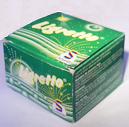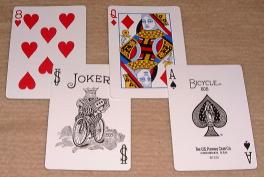Spit, also referred to as Slam or Speed, is a game of the shedding family of card games for two players. The game is played until all of someone's cards are gone.

Flinch is a card game that was invented in 1901 by A.J. Patterson. Flinch is a card game that is based on stockpiling. The game is played with a custom deck and was first produced by the Flinch Card Company in Kalamazoo. This custom deck has 150 cards: ten sets of cards numbered from one to fifteen. Some variations use a deck that has 144 cards. Flinch is based on another game called "Spite and Malice".
Slapjack, also known as Slaps, is a simple standard-deck card game, generally played among children. It can often be a child's first introduction to playing cards. The game is a cross between Beggar-My-Neighbour and Egyptian Ratscrew and is also sometimes known as Heart Attack. It is also related to the simpler 'slap' card games often called Snap.
Spite and Malice, also known as Cat and Mouse, is a traditional card game for two or more players. It is a reworking of the late 19th century Continental game Crapette, and is a form of competitive solitaire with a number of variations that can be played with two or three regular decks of cards.

Ligretto is a card game for two to twelve players. The aim of the game is to get rid of all your cards faster than all the other players by discarding them in the middle of the table. Instead of taking turns, all players play simultaneously. Play is fast and lively, and demands attention to the cards being played by others as well as one's own cards. It can be played and enjoyed equally by children from 8 years old to adult with youth being at no disadvantage.

Rummy is a group of matching-card games notable for similar gameplay based on matching cards of the same rank or sequence and same suit. The basic goal in any form of rummy is to build melds which consists of sets, three or four of a kind of the same rank; or runs, three or more cards in sequence, of the same suit. If a player discards a card, making a run in the discard pile, it may not be taken up without taking all cards below the top one. The Mexican game of Conquian is considered by games scholar David Parlett to be ancestral to all rummy games, which itself is derived from a Chinese game called Khanhoo. The rummy principle of drawing and discarding with a view to melding appears in Chinese card games at least in the early 19th century, and perhaps as early as the 18th century.

Snap is a popular card game in which players deal cards and react quickly to spot pairs of cards of the same rank. Cards are either dealt into separate piles around the table, one per player, or into a single shared pile.
Narcotic is a Patience game which has the objective of discarding playing cards from the tableau. It is also called Idiot's Delight or Perpetual Motion because of the time-consuming process of the game. However, Perpetual Motion is also the alternative name of another patience called Rondo or Eight-Day Clock.
Gargantua is a solitaire card game that is a version of Klondike using two decks. It is also known as Double Klondike and as Jumbo.
Matrimony is a solitaire card game: which uses two decks of 52 playing cards each. It is a difficult game which depends mostly on luck and is sometimes mechanical. It is also one of the many games where there are no clear rules but with two versions. The one described below is laid out by Peter Arnold in his book Card Games for One (ISBN 0-600-60727-5).

Skip-Bo is a commercial version of the card game Spite and Malice. In 1967, Minnie Hazel "Skip" Bowman (1915–2001) of Brownfield, Texas, began producing a boxed edition of the game under the name SKIP-BO. In 1980 the game was purchased by International Games, which was subsequently bought by Mattel in 1992. A mobile version of the game for iOS was released by Magmic in September, 2013. There is a new version called "SKIP-BO Mod" that comes in a white and blue case.
St. Helena is a solitaire card game using two decks of playing cards mixed together. Despite its name, it has no connection to the island with the same name. Furthermore, because of its game rules, it should not be confused with the game Napoleon at St. Helena, a.k.a. Forty Thieves.
Speed is a game for two players or more of the shedding family of card games, in which each player tries to get rid of all of his or her cards first.
Kings in the Corner is a multi-player solitaire-style card game using one deck of standard playing cards with between two and four players participating.

Monopoly: The Card Game is loosely based on the board game Monopoly. The idea is to draw, trade and organize cards into "color-groups" along with bonus cards. Players take turns drawing and discarding cards until one completes a hand. The value of each player's hand is then counted and they receive the amount of Monopoly money they have earned. The first person to collect $100,000,000 wins.
Leoni's Own, also known as Weavers, is a solitaire card game which is played with two decks of playing cards shuffled together. This game may have come from Austria, takes approximately 20 minutes and is described as medium regarding difficulty and also uses an ingenious method called weaving, which is explained below in this article.
Switch, also called Two Four Jacks or Irish Switch, or Last Card, in New Zealand, is a shedding-type card game for two or more players that is popular in the United Kingdom, Ireland and as alternative incarnations in other regions. The sole aim of Switch is to discard all of the cards in one's hand; the first player to play his or her final card, and ergo have no cards left, wins the game. Switch is very similar to the games UNO, Flaps and Mau Mau, both belonging to the larger Crazy Eights or Shedding family of card games.
There are various games and applications available in Windows Live Messenger that can be accessed via the conversation window by clicking the games icon and challenging your "buddy".

Ponytail Canasta is a variation of the card game Canasta. The rules for Canasta were standardized in North America around the 1950s, it was this version of the game that gained worldwide popularity. In many countries, Classic Canasta is still played in more or less its original form, sometimes alongside a number of variations.
Egyptian Ratscrew is a card game of the matching family of games. The game is similar to the 19th-century British card game Beggar-My-Neighbour, with the added concept of "slapping" cards when certain combinations are played, similar to and perhaps borrowed from Slapjack.






